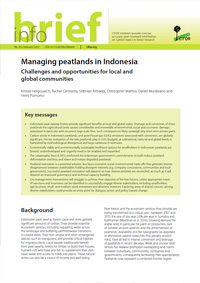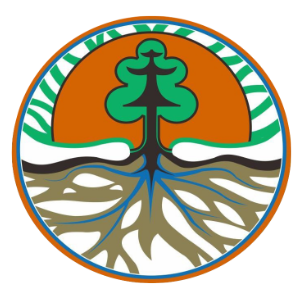Managing peatlands in Indonesia: Challenges and opportunities for local and global communities
Source: https://www.cifor.org/library/6449/

Key messages
- Indonesian peat swamp forests provide significant benefits at local and global scales. Drainage and conversion of these peatlands into agricultural lands causes considerable and irreversible environmental, social and economic damage, associated in particular with recurrent large-scale fires. Such consequences likely outweigh any short-term private gains.
- Carbon stocks in Indonesias peatlands, and greenhouse gas (GHG) emissions associated with conversion, are globally significant. Precise evaluation of the role peatlands play in GHG budgets, at subnational, national and global levels, is hampered by methodological divergences and large variations in estimates
- Economically viable and environmentally sustainable livelihood options for smallholders in Indonesian peatlands are limited, underdeveloped and urgently need to be enabled and expanded.
- The catastrophic fires of 2015 reinforced the Indonesian government’s commitments to both reduce peatland deforestation and fires, and rewet and restore degraded peatlands.
- Peatland restoration is a potential solution, but faces economic-social-environmental trade-offs that generate intense disagreement between stakeholders holding divergent interests (e.g. company concessions, communities and local government). Successful peatland restoration will depend on how diverse priorities are reconciled, as much as it will depend on improved governance and technical capacity building.
- Fire management interventions will struggle to achieve their objective of fire-free futures, unless appropriate mixes of sanctions and incentives can be identified to successfully engage diverse stakeholders, including smallholders, agri-business, small- and medium-sized enterprises and absentee investors. Exploring areas of shared concern among diverse stakeholders could provide an entry point for dialogue, action and policy toward change.
Topic: peatlands, swamps, forests, carbon sinks, emissions, greenhouse gases, deforestation, forest fires, fire
Series: CIFOR Infobrief no. 205
Pages: 8p
Publisher: Center for International Forestry Research (CIFOR), Bogor, Indonesia
PublicationYear: 2018
g







